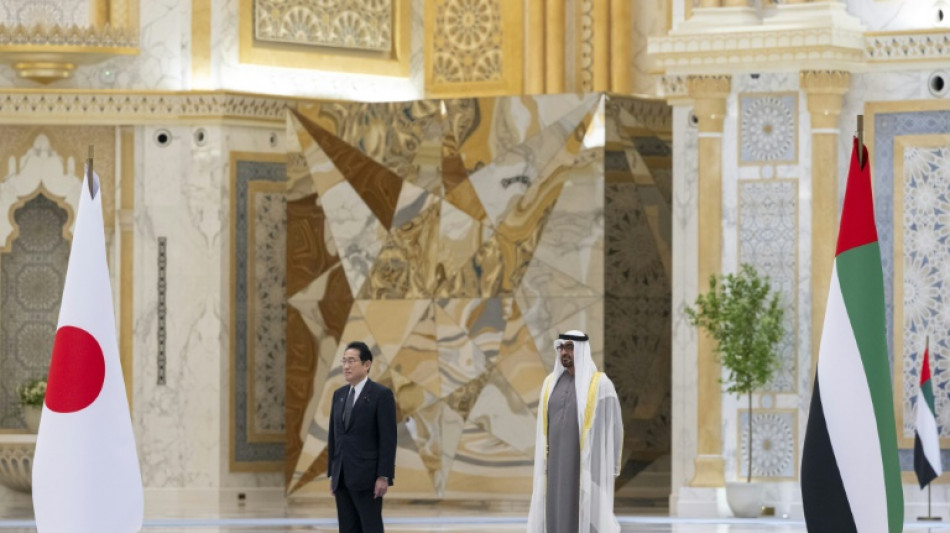Japanese Prime Minister Fumio Kishida arrived in the UAE on Monday to discuss cooperation on clean hydrogen, ammonia and recycled carbon fuels ahead of this year's UN climate talks in Dubai.
Kishida's visit to the United Arab Emirates, which will host COP28 in November-December, is part of the first Gulf tour by a Japanese premier since the late Shinzo Abe in 2020.
Japan relies almost entirely on imports for its crude oil, with Saudi Arabia, the UAE and Qatar accounting for the bulk of its supplies.
As the Asian country increases the role of renewables in its energy mix, the Gulf states, too, are moving more towards cleaner energy sources.
Kishida flew in from Saudi Arabia, where he met de facto leader Crown Prince Mohammed bin Salman on Sunday. After talks with UAE President Sheikh Mohammed bin Zayed Al Nahyan in Abu Dhabi, he will head to Qatar on Tuesday.
The Japanese PM plans to offer Japan's "cutting-edge decarbonisation technologies" as part of a green energy initiative for the Middle East, he said in an open letter carried by the UAE's official WAM news agency.
Tokyo's embassy confirmed the comments.
Under the initiative, the UAE and Japan "will be well placed to collaborate in the related fields of hydrogen and ammonia production and utilisation as well as carbon recycling", Kishida added.
As the oil-rich UAE gears up to host the COP28 United Nations climate talks, many countries remain far apart on ways to reduce fossil fuels and the global warming they cause.
"Japan will work closely with the UAE towards the success of COP28," Kishida said.
On Monday, Sheikh Mohammed said he held "fruitful and constructive discussions" with Kishida in Abu Dhabi on "developing bilateral relations and advancing the comprehensive strategic partnership between our two countries".
- 'Clean energy cooperation' -
On Sunday, Kishida discussed energy security and decarbonisation with senior Saudi officials including Prince Mohammed in the Red Sea city of Jeddah, official Saudi statements said.
During the meeting with Prince Mohammed, Tokyo and Saudi Arabia agreed to launch the "Lighthouse Initiative for Clean Energy Cooperation," according to the official Saudi Press Agency.
"The initiative will support the ongoing efforts that Saudi Arabia is undertaking to become a hub for clean energy," said a joint statement carried by SPA on Monday.
It will focus on areas including hydrogen, ammonia, recycled carbon fuels and carbon capture technology, the statement said.
Saudi Arabia is the biggest oil exporter to Japan, fulfilling 40 percent of its total needs, the kingdom's Energy Minister Prince Abdulaziz bin Salman said on Sunday.
"The Kingdom, based on its commitment to the strategic relationship with Japan in the field of energy, will continue to ensure the security of oil supplies to Japan," he said, in comments published on his ministry's website.
During Kishida's visit, Saudi Arabia and Tokyo signed 26 cooperation agreements, including in the fields of energy and green energy, according to the state-run Al Ekhbariya TV.
The six-member Gulf Cooperation Council and Japan on Sunday also announced the resumption of Free Trade Agreement (FTA) negotiations, according to a GCC statement.
The GCC-Japan FTA negotiations began in Tokyo in September 2006 but talks were suspended in 2009.
"Japan is considered as one of the priorities of the Council," GCC Secretary General Jasem Mohamed AlBudaiwi said, hailing "a new era of partnership".
The prime minister was due to visit Saudi Arabia, the UAE and Qatar in August last year, but he postponed the trip after contracting the coronavirus.
His visit comes at a time of deepening engagement between the region and China which brokered a shock detente between Gulf rivals Saudi Arabia and Iran in March.
W.Atwal--BD
